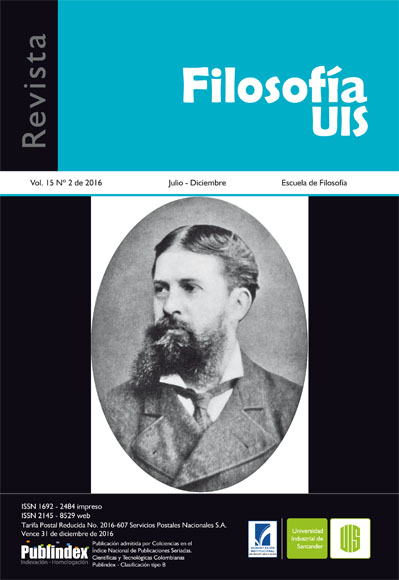Publicado 30-11-2016
Palabras clave
- Aristóteles,
- autarquía,
- ética,
- eudaimonía,
- política
Cómo citar
Derechos de autor 2016 Revista Filosofía UIS

Esta obra está bajo una licencia internacional Creative Commons Atribución 4.0.
Resumen
En este artículo se intenta mostrar cuál es la posible relación entre la esfera política y la esfera ética en el pensamiento de Aristóteles. ¿Son la política y la ética investigaciones absolutamente distinguibles o, por el contrario, son un solo proyecto investigativo? Para responder a esta pregunta, se sugiere que primero debe responderse la cuestión acerca de la naturaleza misma del bien último. ¿Es el fin de las acciones un fin dominante o inclusivo? Se analiza una de las propiedades de la eudaimonía, a saber, la autarquía, y se mostrará cómo, dependiendo de la respuesta que se dé a la segunda pregunta, es posible contestar la primera.
Descargas
Citas
- Ackrill, J.L. (1997). “Aristotle on eudaimonia”. En Essays on Plato and Aristotle (pp. 179-200). Oxford: Oxford University Press.
- Aristóteles (1985). Ética Nicomáquea. Madrid: Gredos.
- Aristóteles (2000). Política. Madrid: Alianza.
- Bodéüs, R. (1993). The political dimensions of Aristotle’s Ethics. New York: New York Press.
- Cooper, J. (1975). Reason and Human Good in Aristotle. Londres: Harvard University Press.
- Cooper, J. (1998). “Contemplation and Happiness: A Reconsideration”. En Reason and Emotion: Essays on Ancient Moral Psychology and Ethical Theory (pp. 212-336) Princeton: Princeton University Press.
- Gauthier, R. (1973). La morale d’Aristote. París: P.U.F.
- Hardie, W. (1965). “The Final Good in Aristotle’s Ethics”. Philosophy, XL(154), 277-295.
- Hardie, W. (1968). Aristotle’s Ethical Theory. Oxford: Oxford University Press.
- Irwin, T. (1991). “Review: The structure of Aristotelian Happiness”. Ethics, 101(2), 382-391.
- Kenny, A. (1992). Aristotle on the Perfect Life. Oxford: Oxford University Press.
- Kraut, R. (1989). Aristotle on the Human Good. Princeton: Princeton University Press.
- Lawrence, G. (2006). “Human Good and Human Function”. En Kraut (Ed.), The Blackwell Guide to Aristotle’s Nicomachean Ethics (37-75) New Jersey: Blackwell Publishing.
- Shofield, M. (2006). “Aristotle’s Political Ethics”. En: Kraut (ed.), The Blackwell Guide to Aristotle’s Nicomachean Ethics (305-322) New Jersey: Blackwell Publishing.
